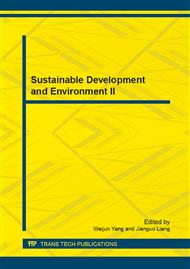p.1461
p.1465
p.1470
p.1474
p.1480
p.1486
p.1492
p.1496
p.1502
The Effects of the Intake-Gas Temperature on the Energy-Efficient of the Urban Bus
Abstract:
This thesis mainly describes the investigation and experiment in the improvements of engine cabin temperature of the CDK6121CAR urban bus with a four-stroke natural gas engine. The aim of this project is to improve its fuel economy. It introduces an engine cabin temperature modified project of an urban bus in Chengdu, it use various measures to change conduct heat and air movement in engine cabin. The bus gas consumption of one hundred kilometers is downgraded from 60.5 m3 to 57.6 m3. It reduces nearly five percentages. This project has characteristics of energy saving and environmental friend.
Info:
Periodical:
Pages:
1480-1485
Citation:
Online since:
September 2013
Authors:
Price:
Сopyright:
© 2013 Trans Tech Publications Ltd. All Rights Reserved
Share:
Citation:


